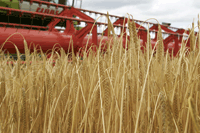Harvest well under way in south and east EU

Harvest is well under way in southern and eastern regions of the EU with progress also being made in the Black Sea region.
Recent wet weather has raised quality concerns in some areas but should benefit grain filling in northern Europe.
Western Europe
In Spain, Strategie Grains reports that 70% of barley and 20% of wheat (excluding durum) was harvested by 8 July. The country has experienced a more normal growing season in 2009, after two exceptional seasons that produced barley crops of 11m tonnes. This year’s crop is expected at a more normal 7.3m tonnes.
The German harvest has begun in all regions and is two weeks ahead of normal. Barley yields are 10% below 2008, according to farmers’ association DBV. However, heavy rains have now interrupted harvest.
The French barley harvest is also under way. Crop output is predicted to be 12m tonnes, slightly lower than 2008. Malting quality is seen as good with selection rates high.
Eastern Europe
Earlier dry conditions have damaged yield potential in some EU member states so, as harvest progresses, variable results are expected. Bulgaria is one of the worst-affected countries – government figures put the wheat crop at 1m tonnes below last season at 3.5m tonnes.
By 15 July Bulgarian farmers had harvested almost a third of the crop, but rain and hail may have affected quality. In Romania, wheat is 38% harvested with yields better than expected but below 2008 levels . Quality is expected to be poorer with 70% feed against the norm of 50%.
Russia and Ukraine
Feed barley harvest is complete in south Russia, with winter wheat 10-25% complete across the southern regions. Yields are reportedly lower than last year with heat stress reported in central and northern crops. In Ukraine, a third of barley and just a little less of wheat had been harvested by 15 July, according to UkraAgroConsult. Yields appear to be below last year but quality is seen as better.
What it means for the UK
A lower Spanish grain crop could be important for UK exports, especially as Black Sea crops are also lower. However, higher opening stocks will compete with the new crop. Quality problems in some areas could support EU milling premiums and aid UK milling wheat exports, provided the weather clears up and allows crops to be harvested in good time.

